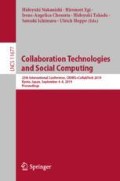Abstract
In many engineering schools around the world, ethics is a compulsory subject. However, teaching ethics in engineering is not a simple duty, as engineering students usually attribute less value to learning ethics than to other subjects. Hereby, we report on our initial efforts towards developing a CSCL script for fostering meaningful ethical discussions among engineering students in the classroom. The script comprises successive phases in which the students conduct ethical judgments individually, in a small group and in a teacher-mediated class group discussion. The process seeks that students cast their judgments without inhibitions, so it maintains students’ anonymity in all phases. A trial with 35 engineering students confirmed that the tool offers a good usability, averaging a 79.9 score in the System Usability Scale (SUS). Furthermore, the trial cohort highlighted the convenience of anonymity when discussing ethical cases. Analysis of student behavior revealed that ethical judgments tend to be stable across the activity. However, judgments changed mostly in groups where more discussion was generated. In the future, we will study whether group composition that maximizes the heterogeneity of the students in the groups according to their individual ethical appraisals increases the likelihood of students varying their ethical judgments, as a result of argumentative and reflexive processes in discussions.
Access this chapter
Tax calculation will be finalised at checkout
Purchases are for personal use only
References
ABET: Rationale for revising criteria 3. http://www.abet.org/accreditation/accreditation-criteria/accreditation-alerts/rationale-for-revising-criteria-3/. Accessed 1 Apr 2019 (2016)
Patel, P.: Engineers, Ethics, and the VW Scandal. IEEE Spectrum, 25th September 2015. http://spectrum.ieee.org/cars-that-think/at-work/education/vw-scandal-shocking-but-not-surprising-ethicists-say. Accessed 1 Apr 2019
EMOL: UC suspende hasta por un año a alumnos que participaron en copia masiva por WhatsApp. https://www.emol.com/noticias/Nacional/2016/06/23/809292/UC-suspende-hasta-por-un-ano-a-alumnos-que-participaron-en-copia-masiva-por-WhatsApp.html. Accessed 1 Apr 2019 (2016)
Sarangi, S., Sharma, P.: Artificial Intelligence: Evolution, Ethics and Public Policy. Routledge, India (2018)
Holsapple, M.A., Carpenter, D.D., Sutkus, J.A., Finelli, C.J., Harding, T.S.: Framing faculty and student discrepancies in engineering ethics education delivery. J. Eng. Educ. 101(2), 169–186 (2012). https://doi.org/10.1002/j.2168-9830.2012.tb00047.x
Sunderland, M.E.: Sci. Eng. Ethics (2013). https://doi.org/10.1007/s11948-013-9444-5
Génova, G., González, M.R.: Teaching ethics to engineers: a socratic experience. Sci. Eng. Ethics 22(2), 567–580 (2016). https://doi.org/10.1007/s11948-015-9661-1
Hess, J.L., Fore, G.: A systematic literature review of US engineering ethics interventions. Sci. Eng. Ethics 24(2), 551–583 (2018)
Kohlberg, L., Hersh, R.H.: Moral development: a review of the theory. Theor. Pract. 16(2), 53–59 (1977). https://doi.org/10.1080/00405847709542675
Dillenbourg, P.: Over-scripting CSCL: The risks of blending collaborative learning with instructional design. In: Kirschner, P.A. (ed.) Three Worlds of CSCL. Can We Support CSCL?, pp. 61–91. Open Universiteit Nederland, Heerlen (2002)
May, D.R., Luth, M.T.: The effectiveness of ethics education: a quasi-experimental field study. Sci. Eng. Ethics 19(2), 545–568 (2013). https://doi.org/10.1007/s11948-011-9349-0
Bandura, A.: Perceived self-efficacy in cognitive development and functioning. Educ. Psychol. 28(2), 117–148 (1993)
Weinberger, A., Ertl, B., Fischer, F., Mandl, H.: Epistemic and social scripts in computer–supported collaborative learning. Instr. Sci. 33(1), 1–30 (2005)
Weinberger, A.: Principles of transactive computer-supported collaboration scripts. Nordic J. Digit. Literacy 6(03), 189–202 (2011)
Hernández Leo, D., Asensio-Pérez, J.I., Dimitriadis, Y.: Computational representation of collaborative learning flow patterns using IMS learning design. J. Educ. Technol. Soc. 8(4), 75–89 (2005)
Hoffmann, M., Borenstein, J.: Understanding Ill-Structured engineering ethics problems through a collaborative learning and argument visualization approach. Sci. Eng. Ethics 20(1), 261–276 (2014). https://doi.org/10.1007/s11948-013-9430
Binder, P.: The intersection of ethical decision-making modules and classroom response systems in business education. The Future of Education, Florence, Italy. Accessed 9 June 2013 (2013)
Butchart, S., Handfield, T., Restall, G.: Using peer instruction to teach philosophy, logic, and critical thinking. Teach. Philos. 32(1), 1–40 (2009)
Node.js. https://nodejs.org/en/. Accessed 16 Mar 2019 (2019)
Express.js. https://expressjs.com/. Accessed 16 Mar 2019 (2019)
PostgreSQL. https://www.postgresql.org/. Accessed 16 Mar 2019 (2019)
EJS. https://ejs.co/. Accessed 16 Mar 2019 (2019)
Bootstrap. https://getbootstrap.com/. Accessed 16 Mar 2019 (2019)
Tan, J.: Onerous favorites. markkula center for applied ethics, Santa Clara University. https://www.scu.edu/ethics/focus-areas/more/engineering-ethics/engineering-ethics-cases/onerous-favorites/. Accessed 16 Mar 2019 (2015)
Bangor, A., Kortum, P.T., Miller, J.T.: An empirical evaluation of the system usability scale. Int. J. Hum.-Comput. Interact. 24(6), 574–594 (2008)
Quanteda. https://quanteda.io/. Accessed 15 Apr 2019 (2019)
Acknowledgements
This research has been funded by CONICYT Fondecyt Initiation into Research grant 11160211, and Fondecyt Regular grant 1161200.
Author information
Authors and Affiliations
Corresponding author
Editor information
Editors and Affiliations
Rights and permissions
Copyright information
© 2019 Springer Nature Switzerland AG
About this paper
Cite this paper
Alvarez, C., Zurita, G., Baloian, N., Jerez, O., Peñafiel, S. (2019). A CSCL Script for Supporting Moral Reasoning in the Ethics Classroom. In: Nakanishi, H., Egi, H., Chounta, IA., Takada, H., Ichimura, S., Hoppe, U. (eds) Collaboration Technologies and Social Computing. CRIWG+CollabTech 2019. Lecture Notes in Computer Science(), vol 11677. Springer, Cham. https://doi.org/10.1007/978-3-030-28011-6_5
Download citation
DOI: https://doi.org/10.1007/978-3-030-28011-6_5
Published:
Publisher Name: Springer, Cham
Print ISBN: 978-3-030-28010-9
Online ISBN: 978-3-030-28011-6
eBook Packages: Computer ScienceComputer Science (R0)

